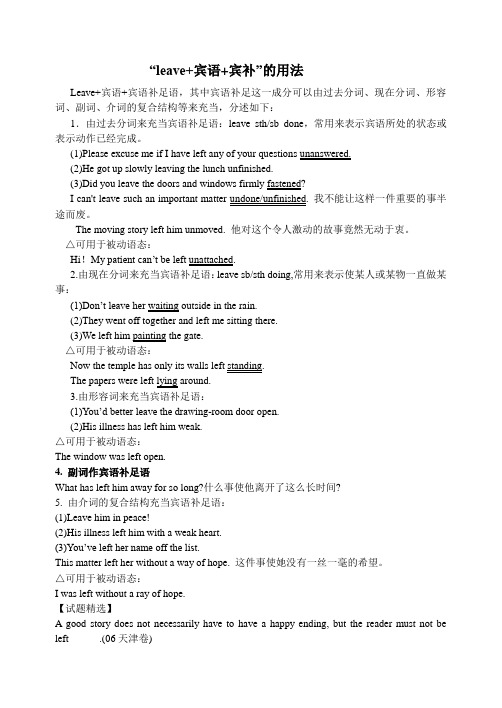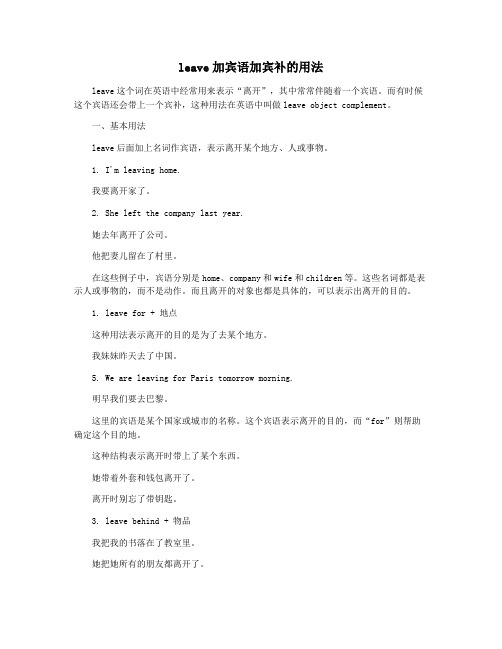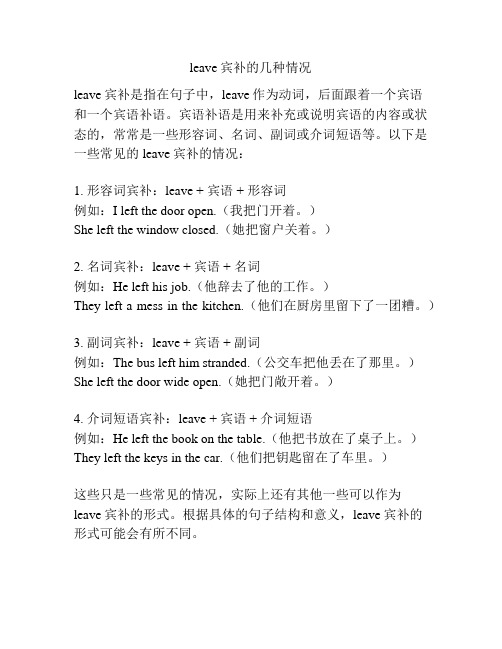leave+宾语+宾补的用法(可编辑修改word版)
leave+宾语+宾补

• 公式六.leave +宾语+ 名词 • The earthquake left him an orphan. • 公式七:leave +宾语+不定式 • She left her mother to take care of her baby.
_l_ea_v_e_the windows c_l_o_se_d____(让窗子关着)
• 2. Don’lte_a_v_e___himw_a_i_ti_n_g_(等着)outside in
the train.
• 3.He would like to l_e_av_e__the apple _u_n_e_a_te_n(未 吃完的)up and threw away.
• (1)Don’t leave her waiting outside in the rain. • (2)They went off together and left me sitting
there. • (3)We left him painting the gate. • They all waked out and left me sitting there all by
• A.leaving, unlocked B. leaving, unlocking
• C. left, unlocked D. to leave, unlocking
• 4. Don’t leave the water _A____ while you brush your
teeth. A. running
leave作为使役动词用时 leave +宾语+ 宾补
leave+宾语+宾补的用法

The movingstory left himunmoved.他对这个令人激动的故事竟然无动于衷。
2.由现在分词来充当宾语补足语:leave sb/sth doing,常用来表示使某人或某物一直做某事(宾语和宾补被动关系).
3.由形容词来充当宾语补足语:
(1)You’dbetter leavethe drawing-room dooropen.
(2)Hisillnesshaslefthimweak.
△可用于被动语态:
Thewindow wasleft open.
4.由副词作宾语补足语
(1)What haslefthimawayfor so long?什么事使他离开了这么长时间?
3.John rushed outin a hurry,______the door _______.
A.leaving, unlocked B. leaving, unlocking C.left,unlockedD.toleave, unlocking
4.Don’tleave the water______ whileyou brushyour teeth.
△可用于被动语态:
I wasleftwithout a ray of hope.
5.由名词作宾语补足语
The earthquakelefthim an orphan.
【试题精选】
1.Agoodstorydoes notnecessarilyhavetohaveahappyending,but thereadermust notbe left______.(06天津卷)
leave+宾语+宾补

“leave+宾语+宾补”的用法Leave+宾语+宾语补足语,其中宾语补足这一成分可以由过去分词、现在分词、形容词、副词、介词的复合结构等来充当,分述如下:1.由过去分词来充当宾语补足语:leave sth/sb done,常用来表示宾语所处的状态或表示动作已经完成。
(1)Please excuse me if I have left any of your questions unanswered.(2)He got up slowly leaving the lunch unfinished.(3)Did you leave the doors and windows firmly fastened?I can't leave such an important matter undone/unfinished. 我不能让这样一件重要的事半途而废。
The moving story left him unmoved. 他对这个令人激动的故事竟然无动于衷。
△可用于被动语态:Hi!My patient can’t be left unattached.2.由现在分词来充当宾语补足语:leave sb/sth doing,常用来表示使某人或某物一直做某事:(1)Don’t leave her waiting outside in the rain.(2)They went off together and left me sitting there.(3)We left him painting the gate.△可用于被动语态:Now the temple has only its walls left standing.The papers were left lying around.3.由形容词来充当宾语补足语:(1)You’d better leave the drawing-room door open.(2)His illness has left him weak.△可用于被动语态:The window was left open.4. 副词作宾语补足语What has left him away for so long?什么事使他离开了这么长时间?5. 由介词的复合结构充当宾语补足语:(1)Leave him in peace!(2)His illness left him with a weak heart.(3)You’ve left her name off the list.This matter left her without a way of hope. 这件事使她没有一丝一毫的希望。
leave加宾语加宾补的用法

leave加宾语加宾补的用法leave这个词在英语中经常用来表示“离开”,其中常常伴随着一个宾语。
而有时候这个宾语还会带上一个宾补,这种用法在英语中叫做leave object complement。
一、基本用法leave后面加上名词作宾语,表示离开某个地方、人或事物。
1. I'm leaving home.我要离开家了。
2. She left the company last year.她去年离开了公司。
他把妻儿留在了村里。
在这些例子中,宾语分别是home、company和wife和children等。
这些名词都是表示人或事物的,而不是动作。
而且离开的对象也都是具体的,可以表示出离开的目的。
1. leave for + 地点这种用法表示离开的目的是为了去某个地方。
我妹妹昨天去了中国。
5. We are leaving for Paris tomorrow morning.明早我们要去巴黎。
这里的宾语是某个国家或城市的名称。
这个宾语表示离开的目的,而“for”则帮助确定这个目的地。
这种结构表示离开时带上了某个东西。
她带着外套和钱包离开了。
离开时别忘了带钥匙。
3. leave behind + 物品我把我的书落在了教室里。
她把她所有的朋友都离开了。
这个宾补可以是一个具体的物品,也可以是一个抽象的概念。
有时候,leave后面还可以加上一个形容词,表示离开时的状态或某种感觉。
我离开时感到很生气。
四、leave加动词不定式的用法我的朋友离开了,去坐火车。
我要离开了,开始新的生活。
这个宾补通常是动词的原形形式,这样可以准确传达出离开的目的或者愿望。
总结leave加宾语加宾补的用法比较灵活,可以根据不同的语境来做出调整。
在表达的过程中,需要注意宾语的类型、目的地、带上的物品、留下的物品,还有离开的状态和意愿等等。
只要掌握好这些要点,就可以很好地运用这种结构,用简洁而准确的语言来传达我们的意思。
leave宾补的几种情况

leave宾补的几种情况
leave宾补是指在句子中,leave作为动词,后面跟着一个宾语
和一个宾语补语。
宾语补语是用来补充或说明宾语的内容或状态的,常常是一些形容词、名词、副词或介词短语等。
以下是一些常见的leave宾补的情况:
1. 形容词宾补:leave + 宾语 + 形容词
例如:I left the door open.(我把门开着。
)
She left the window closed.(她把窗户关着。
)
2. 名词宾补:leave + 宾语 + 名词
例如:He left his job.(他辞去了他的工作。
)
They left a mess in the kitchen.(他们在厨房里留下了一团糟。
)
3. 副词宾补:leave + 宾语 + 副词
例如:The bus left him stranded.(公交车把他丢在了那里。
)She left the door wide open.(她把门敞开着。
)
4. 介词短语宾补:leave + 宾语 + 介词短语
例如:He left the book on the table.(他把书放在了桌子上。
)They left the keys in the car.(他们把钥匙留在了车里。
)
这些只是一些常见的情况,实际上还有其他一些可以作为
leave宾补的形式。
根据具体的句子结构和意义,leave宾补的
形式可能会有所不同。
leave宾语宾补的用法

法总结Leave+宾语+宾语补足语,其中宾语补足语这一成分可以由过去分词、现在 分词、形容词、副词、介词的复合结构等来充当,意思是”使••…处于…状态;听 任;让”现分述如下:1. 由过去分词来充当宾语补足语:leave sth/sb done ,常用来表示宾语所处 的状态或表示动作已经完成。
(宾语和宾补被动关系)(1) He got up slowly, leav ing the lunch unfini shed.(2) Did you leave the doors and win dows firmly faste ned?(3) 1 can't leave such an important matter undone/unfinished. 我不能让这样一 件重要的事半途而废。
The movi ng story left him unm oved.他对这个令人激动的故事竟然无动于 衷。
2. 由现在分词来充当宾语补足语:leave sb/sth doing,常用来表示使某人或某 物一直做某事(宾语和宾补被动关系).(1) Don ' t leave her waiting outside in the rain.(2) They went off together and left me sitti ng there.(3) We left him pain ti ng the gate.△可用于被动语态:The papers were left lying aro und.3. 由形容词来充当宾语补足语:(2)His ill ness has left him weak.△可用于被动语态:leave 宾语+xx (即leave 复合结构)的用 (1) You d better leave the drawin m door ope n.The wi ndow was left ope n.4•由副词作宾语补足语(1) What has left him away for so lo ng?什么事使他离开了这么长时间?(2) We can ' t leave the light on when leaving.5.由介词的复合结构充当宾语补足语:(1) Leave him in peace!(2) His ill ness left him with a weak heart.(3) You ' ve left her name off the list.⑷This matter left her without a way of hope.这件事使她没有一丝一毫的希望。
leave宾补的几种情况

leave宾补的几种情况一、以leave宾补的情况一:leave + 名词宾语leave可以用来表示某人离开某地或将某物留在某处。
在这种情况下,leave后面可以跟名词宾语,表示被离开的地点或被留下的物品。
例如:1. He left his bag on the bus.(他把包忘在公交车上了。
)2. Don't forget to leave a note on the table.(别忘了在桌子上留个便条。
)3. She left her phone at home.(她把手机落在家里了。
)二、以leave宾补的情况二:leave + 宾补(动词不定式)leave还可以与动词不定式构成宾补,表示某人离开某地或将某事交给他人去做。
例如:1. He left to catch the train.(他离开去赶火车了。
)2. Don't leave your homework to the last minute.(别把作业拖到最后一刻。
)3. She left me to deal with the problem on my own.(她让我自己处理这个问题。
)三、以leave宾补的情况三:leave + 宾补(形容词)leave还可以与形容词构成宾补,表示某人离开后给人留下某种感觉或状态。
例如:1. The movie left me feeling inspired.(这部电影让我感到鼓舞。
)2. His words left her speechless.(他的话让她无言以对。
)3. The news left us all shocked.(这个消息让我们都感到震惊。
)四、以leave宾补的情况四:leave + 宾补(副词)leave还可以与副词构成宾补,表示某人离开后以某种方式或状态。
例如:1. He left quietly, without saying a word.(他悄悄地离开了,一言不发。
(完整版)leave+宾语+宾补的用法

“leave+宾语+宾补”(即leave复合结构)的用法总结Leave+宾语+宾语补足语,其中宾语补足语这一成分可以由过去分词、现在分词、形容词、副词、介词的复合结构等来充当,意思是”使.....处于…..状态;听任;让”现分述如下:1.由过去分词来充当宾语补足语:leave sth/sb done,常用来表示宾语所处的状态或表示动作已经完成。
(宾语和宾补被动关系)(1)He got up slowly, leaving the lunch unfinished.(2)Did you leave the doors and windows firmly fastened?(3)I can't leave such an important matter undone/unfinished. 我不能让这样一件重要的事半途而废。
The moving story left him unmoved. 他对这个令人激动的故事竟然无动于衷。
2.由现在分词来充当宾语补足语:leave sb/sth doing,常用来表示使某人或某物一直做某事(宾语和宾补被动关系).(1)Don’t leave her waiting outside in the rain.(2)They went off together and left me sitting there.(3)We left him painting the gate.△可用于被动语态:The papers were left lying around.3.由形容词来充当宾语补足语:(1)You’d better leav e the drawing-room door open.(2)His illness has left him weak.△可用于被动语态:The window was left open.4.由副词作宾语补足语(1)What has left him away for so long?什么事使他离开了这么长时间?(2)We can’t leave the light on when leaving.5. 由介词的复合结构充当宾语补足语:(1)Leave him in peace!(2)His illness left him with a weak heart.(3)You’ve left her name off the list.(4)This matter left her without a way of hope. 这件事使她没有一丝一毫的希望。
leave 宾语 宾补的用法

“leave+宾语+宾补”(即leave复合结构)的用法总结Leave+宾语+宾语补足语,其中宾语补足语这一成分可以由过去分词、现在分词、形容词、副词、介词的复合结构等来充当,意思是”使.....处于…..状态;听任;让”现分述如下:1.由过去分词来充当宾语补足语:leave sth/sb done,常用来表示宾语所处的状态或表示动作已经完成。
(宾语和宾补被动关系)(1)He got up slowly, leaving the lunch unfinished.(2)Did you leave the doors and windows firmly fastened?(3)I can't leave such an important matter undone/unfinished. 我不能让这样一件重要的事半途而废。
The moving story left him unmoved. 他对这个令人激动的故事竟然无动于衷。
2.由现在分词来充当宾语补足语:leave sb/sth doing,常用来表示使某人或某物一直做某事(宾语和宾补被动关系).(1)Don’t leave her waiting outside in the rain.(2)They went off together and left me sitting there.(3)We left him painting the gate.△可用于被动语态:The papers were left lying around.3.由形容词来充当宾语补足语:(1)You’d better leav e the drawing-room door open.(2)His illness has left him weak.△可用于被动语态:The window was left open.4.由副词作宾语补足语(1)What has left him away for so long?什么事使他离开了这么长时间?(2)We can’t leave the light on when leaving.5. 由介词的复合结构充当宾语补足语:(1)Leave him in peace!(2)His illness left him with a weak heart.(3)You’ve left her name off the list.(4)This matter left her without a way of hope. 这件事使她没有一丝一毫的希望。
leave加宾语加宾补用法六种

leave加宾语加宾补用法六种
1. leave + 宾语 + 形容词/副词
例句:He left the room clean and tidy.(他离开时把房间打扫得干净整洁。
)
2. leave + 宾语 + 名词
例句:Don't forget to leave a tip for the waiter.(别忘了给服务员留下小费。
)
3. leave + 宾语 + 不定式
例句:She left her husband to find a new job.(她离开丈夫去找新工作。
)
4. leave + 宾语 + 名词/代词 + 形容词/副词
例句:We left our children alone at home.(我们把孩子们一个人留在家里了。
)
5. leave + 宾语 + 名词/代词 + 不定式
例句:I left my keys with my neighbor to water the plants.(我把钥匙留给了邻居去给植物浇水。
)
6. leave + 宾语 + 名词/代词 + 宾补
例句:They left him no choice but to accept the offer.(他们没有给他别的选择,只能接受这个提议。
)。
leave加宾语加宾补用法六种

leave加宾语加宾补用法六种
留下:leave + 宾语 + 宾补
例如:
1. 他把门打开,留下了一个空位。
(留下了一个空位是宾补)
2. 妈妈让我留下了一个礼物。
(留下了一个礼物是宾补)
使…成为:leave + 宾语 + 宾补
例如:
1. 这个节目太激动人心了,留下了我深刻的印象。
(留下了我深刻的印象是宾补)
2. 这部电影给观众留下了一个难忘的故事。
(留下了一个难忘的故事是宾补)
使…处于某种状态:leave + 宾语 + 宾补
例如:
1. 他的话让我们留下了疑惑。
(留下了疑惑是宾补)
2. 那个事情让我留下了困惑的状态。
(留下了困惑的状态是宾补)
原封不动地保留:leave + 宾语 + 宾补 + to + 宾语补足语
例如:
1. 他将那个房间保留了下来,用于存放旧书。
(保留了下来,用于存放旧书是宾补)
将…留给:leave + 宾语 + to + 宾补
例如:
1. 他留下了一些钱给孙子们。
(留下了一些钱给孙子们是宾补)
2. 她把工作留给了下一个人。
(留给了下一个人是宾补)
托付给:leave + 宾语 + to + 宾补
例如:
1. 她将书册留给了我。
(留给了我是宾补)
2. 我把这个任务留给了你。
(留给了你是宾补)。
leave+宾语+宾补的用法

“leave+宾语+宾补”(即leave复合结构)的用法总结之阿布丰王创作Leave+宾语+宾语补足语,其中宾语补足语这一成分可以由过去分词、现在分词、形容词、副词、介词的复合结构等来充当,意思是”使.....处于…..状态;听任;让”现分述如下:1.由过去分词来充当宾语补足语:leave sth/sb done,经常使用来暗示宾语所处的状态或暗示动作已经完成。
(宾语和宾补主动关系)(1)He got up slowly, leaving the lunch unfinished.fastened?undone/unfinished. 我不克不及让这样一件重要的事中途而废。
The moving story left him unmoved. 他对这个令人激动的故事竟然无动于衷。
2.由现在分词来充当宾语补足语:leave sb/sth doing,经常使用来暗示使某人或某物一直做某事(宾语和宾补主动关系).waiting outside in the rain.(2)They went off together and left me sitting there.(3)We left him painting the gate.△可用于主动语态:The papers were left lying around.3.由形容词来充当宾语补足语:(1)You’d better leave the drawing-room door open.(2)His illness has left him weak.△可用于主动语态:The window was left open.4.由副词作宾语补足语(1)What has left him away for so long?什么事使他离开了这么长时间?(2)We can’t leave the light on when leaving.5.由介词的复合结构充当宾语补足语:(1)Leave him in peace!(2)His illness left him with a weak heart.(3)You’ve left her name off the list.(4)This matter left her without a way of hope. 这件事使她没有一丝一毫的希望。
leave+宾语+宾补的用法

“leave+宾语+宾补”(即leave复合结构)的用法总结之欧侯瑞魂创作Leave+宾语+宾语补足语,其中宾语补足语这一成分可以由过去分词、现在分词、形容词、副词、介词的复合结构等来充当,意思是”使.....处于…..状态;听任;让”现分述如下:1.由过去分词来充当宾语补足语:leave sth/sb done,经常使用来暗示宾语所处的状态或暗示动作已经完成。
(宾语和宾补主动关系)(1)He got up slowly, leaving the lunch unfinished.(2)Did you leave the doors and windows firmly fastened?(3)I can't leave such an important matter undone/unfinished. 我不克不及让这样一件重要的事中途而废。
The moving story left him unmoved. 他对这个令人激动的故事竟然无动于衷。
2.由现在分词来充当宾语补足语:leave sb/sth doing,经常使用来暗示使某人或某物一直做某事(宾语和宾补主动关系).waiting outside in the rain.(2)They went off together and left me sitting there.(3)We left him painting the gate.△可用于主动语态:The papers were left lying around.形容词来充当宾语补足语:(1)You’d better leave the dr awing-room door open.(2)His illness has left him weak.△可用于主动语态:The window was left open.副词作宾语补足语(1)What has left him away for so long?什么事使他离开了这么长时间?(2)We can’t leave the light on when leaving.5.由介词的复合结构充当宾语补足语:(1)Leave him in peace!(2)His illness left him with a weak heart.(3)You’ve left her name off the list.(4)This matter left her without a way of hope. 这件事使她没有一丝一毫的希望。
leave+宾语+宾补的用法

“leave+宾语+宾补”(即leave复合布局)的用法总结之青柳念文创作Leave+宾语+宾语补足语,其中宾语补足语这一成分可以由过去分词、现在分词、形容词、副词、介词的复合布局等来充当,意思是”使.....处于…..状态;听任;让”现分述如下:1.由过去分词来充当宾语补足语:leave sth/sb done,常常使用来暗示宾语所处的状态或暗示动作已经完成.(宾语和宾补主动关系) (1)He got up slowly, leaving the lunch unfinished.fastened?undone/unfinished. 我不克不及让这样一件重要的事中途而废.The moving story left him unmoved. 他对这个使人激动的故事居然无动于衷.2.由现在分词来充当宾语补足语:leave sb/sth doing,常常使用来暗示使或人或某物一直做某事(宾语和宾补主动关系).(1)Don’t leave her waiting outside in the rain.(2)They went off together and left me sitting there.(3)We left him painting the gate.△可用于主动语态:lying around.形容词来充当宾语补足语:(1)You’d better leave the drawing-room door open.(2)His illness has left him weak.△可用于主动语态:The window was left open.副词作宾语补足语(1)What has left him away for so long?什么事使他分开了这么长时间?(2)We can’t leave the light on when leaving.5.由介词的复合布局充当宾语补足语:(1)Leave him in peace!(2)His illness left him with a weak heart.(3)You’ve left her name off the list.(4)This matter left her without a way of hope. 这件事使她没有一丝一毫的希望.△可用于主动语态:I was left without a ray of hope.名词作宾语补足语The earthquake left him an orphan.【试题精选】1.A good story does not necessarily have to have a happy ending, but the reader must not be left______.(06天津卷)A.unsatisfiedB.unsatisfyingC.tobeunsatisfyingD.being unsatisfied2. His remarks left me ______ about his real purpose.A. wonderedB. wonderC. to wonderD. wondering3. John rushed out in a hurry, ______ the door _______.A.leaving, unlockedB. leaving, unlockingC. left, unlockedD. to leave, unlocking4. Don’t leave the water ______ while you brush your teeth.A. runningB. runC. being runD. to run答案:A D A A。
leave+宾语+宾补

“leave+宾语+宾补”的用法Leave+宾语+宾语补足语,其中宾语补足这一成分可以由过去分词、现在分词、形容词、副词、介词的复合结构等来充当,分述如下:1.由过去分词来充当宾语补足语:leave sth/sb done,常用来表示宾语所处的状态或表示动作已经完成。
(1)Please excuse me if I have left any of your questions unanswered.(2)He got up slowly leaving the lunch unfinished.(3)Did you leave the doors and windows firmly fastened?I can't leave such an important undone/unfinished. 我不能让这样一件重要的事半途而废。
The moving story left him unmoved. 他对这个令人激动的故事竟然无动于衷。
△可用于被动语态:Hi!My patient can’t be left unattached.2.由现在分词来充当宾语补足语:leave sb/sth doing,常用来表示使某人或某物一直做某事:(1)Don’t leave her waiting outside in the rain.(2)They went off together and left me sitting there.(3)We left him painting the gate.△可用于被动语态:Now the temple has only its walls left standing.The papers were left lying around.3.由形容词来充当宾语补足语:(1)You’d better leave the drawing-room door open.(2)His illness has left him weak.△可用于被动语态:The window was left open.4. 副词作宾语补足语What has left him away for so long?什么事使他离开了这么长时间?5. 由介词的复合结构充当宾语补足语:(1)Leave him in peace!(2)His illness left him with a weak heart.(3)You’ve left her name off the list.This matter left her without a way of hope. 这件事使她没有一丝一毫的希望。
leave+宾语+宾补的用法

“leave+宾语+宾补”(即leave复合结构)的用法归纳之阳早格格创做Leave+宾语+宾语补脚语,其中宾语补脚语那一身分不妨由往日分词汇、当前分词汇、形容词汇、副词汇、介词汇的复合结构等去充当,意义是”使.....处于…..状态;听任;让”现分述如下:1.由往日分词汇去充当宾语补脚语:leave sth/sb done,时常使用去表示宾语所处的状态或者表示动做已经完毕.(宾语战宾补主动闭系) (1)He got up slowly, leaving the lunch unfinished.fastened?undone/unfinished. 尔不克不迭让那样一件要害的事中途而兴.The moving story left him unmoved. 他对于那个令人激动的故事竟然漠不关心.2.由当前分词汇去充当宾语补脚语:leave sb/sth doing,时常使用去表示使某人或者某物向去干某事(宾语战宾补主动闭系).(1)Don’t leave her waiting outside in the rain.(2)They went off together and left me sitting there.(3)We left him painting the gate.△可用于主动语态:The papers were left lying around.形容词汇去充当宾语补脚语:(1)You’d better leave the drawing-room door open.(2)His illness has left him weak.△可用于主动语态:The window was left open.副词汇做宾语补脚语(1)What has left him away for so long?什么事使他离启了那样万古间?(2)We can’t leave the light on when leaving.5.由介词汇的复合结构充当宾语补脚语:(1)Leave him in peace!(2)His illness left him with a weak heart.(3)You’ve left her name off the list.(4)This matter left her without a way of hope. 那件事使她不一丝一毫的期视.△可用于主动语态:I was left without a ray of hope.名词汇做宾语补脚语The earthquake left him an orphan.【试题粗选】1.A good story does not necessarily have to have a happy ending, but the reader must not be left______.(06天津卷)A.unsatisfiedB.unsatisfyingC.tobeunsatisfyingD.being unsatisfied2. His remarks left me ______ about his real purpose.A. wonderedB. wonderC. to wonderD. wondering3. John rushed out in a hurry, ______ the door _______.A.leaving, unlockedB. leaving, unlockingC. left, unlockedD. to leave, unlocking4. Don’t leave the water ______ while you brush your teeth.A. runningB. runC. being runD. to run问案:A D A A。
- 1、下载文档前请自行甄别文档内容的完整性,平台不提供额外的编辑、内容补充、找答案等附加服务。
- 2、"仅部分预览"的文档,不可在线预览部分如存在完整性等问题,可反馈申请退款(可完整预览的文档不适用该条件!)。
- 3、如文档侵犯您的权益,请联系客服反馈,我们会尽快为您处理(人工客服工作时间:9:00-18:30)。
“leave+宾语+宾补”
(即leave 复合结构)的用法总结Leave+宾语+宾语补足语,其中宾语补足
语这一成分可以由过去分词、现在分词、形容词、副词、介词的复合结构等来充当,意思是” 使.....处于…..状态;听任;让”现分述如下:
1.由过去分词来充当宾语补足语:leave sth/sb done,常用来表示宾语所处的状态或表示动作已经完成。
(宾语和宾补被动关系)
(1)H e got up slowly, leaving the lunch unfinished.
(2)D id you leave the doors and windows firmly fastened?
(3)I can't leave such an important matter undone/unfinished. 我不能让这样一件重要的
The moving story left him unmoved. 他对这个令人激动的故事竟然无动于衷。
2.由现在分词来充当宾语补足语:leave
sb/sth doing,常用来表示使某人或某物一直做某事(宾语和宾补被动关系).
(1)D on’t leave her waiting outside in the rain.
(2)T hey went off together and left me sitting there.
(3)W e left him painting the gate.
△可用于被动语态:
lying around.
3.由形容词来充当宾语补足语:
(1)Y ou’d better leave the drawing-room door open.
(2)H is illness has left him weak.
△可用于被动语态:
The window was left open.
4.由副词作宾语补足语
(1)W hat has left him away for so long?什么事使他离开了这么长时间?
(2)W e can’t leave the light on when leaving.
5.由介词的复合结构充当宾语补足语:
(1)L eave him in peace!
(2)H is illness left him with a weak heart.
(3)You’ve left her name off the list.
(4)This matter left her without a way of hope.这件事使她没有一丝一毫的希望。
△可用于被动语态:
I was left without a ray of hope.
5.由名词作宾语补足语
The earthquake left him an orphan.
【试题精选】
1.A good story does not necessarily have to have a happy ending, but the reader must not be left .(06 天津卷)
A.unsatisfied
B.unsatisfying
C.to be unsatisfying D.being unsatisfied
2.His remarks left me about his real purpose.
A.wondered
B. wonder
C. to wonder
D. wondering
3.John rushed out in a hurry, the door
.
A.l eaving, unlocked
B. leaving, unlocking
C. left, unlocked
D. to leave, unlocking
while you 4.Don’t leave the water
brush your teeth.
A.running
B. run
C. being run
D. to run
答案:A D A A。
